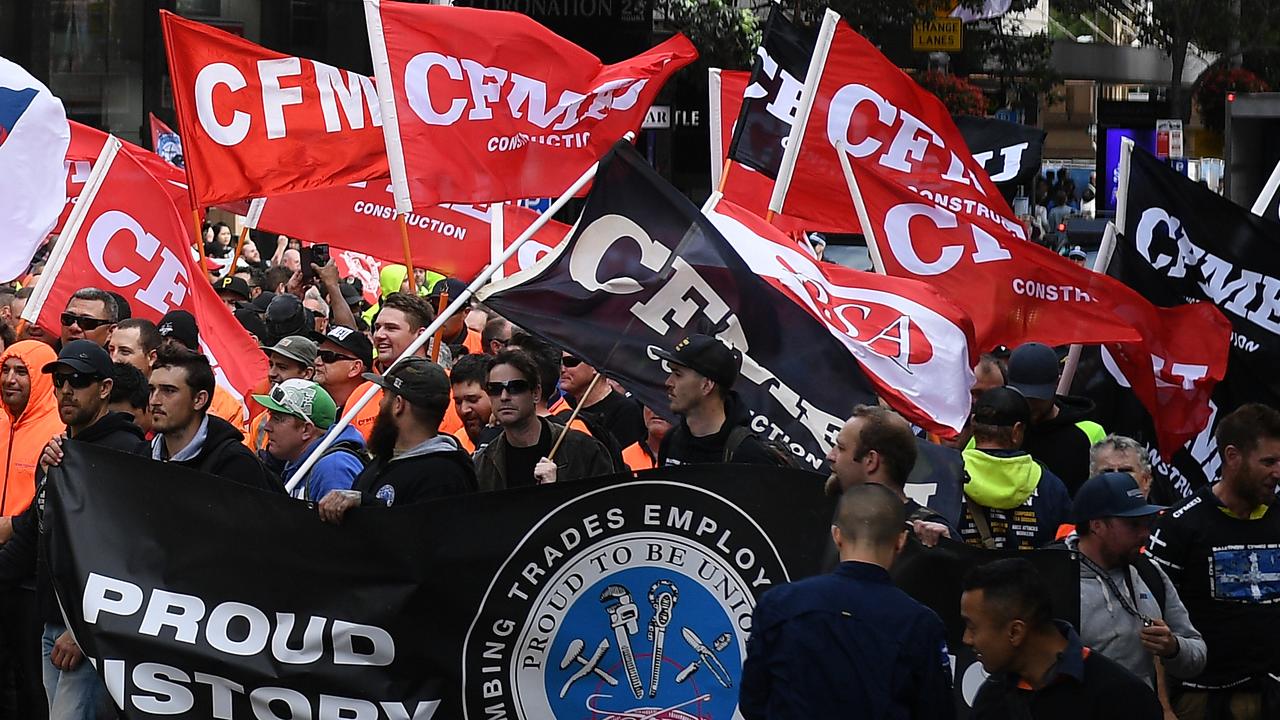FWC boss Iain Ross intervened in Country Fire Authority row
The Fair Work Commission president intervened in the bitter stoush between Victoria’s CFA and the firefighters’ union.

Fair Work Commission president Iain Ross personally intervened in the bitter stoush between Victoria’s Country Fire Authority and the firefighters’ union in a failed bid to resolve a dispute that has damaged Labor’s electoral prospects in key marginal seats.
Mr Ross’s decision to insert himself into the firefighter fracas at the height of the politically charged dispute has been criticised by industrial relations lawyers who see his intervention as a return to a “Labor mates’’ approach to dispute resolution.
UPDATE: CFA chief fire officer quits
On June 9 — the day before the CFA board was sacked by the Andrews government, CFA chief executive Lucinda Nolan quit and former emergency services minister Jane Garrett resigned from cabinet in protest — Mr Ross interrupted his leave from the commission to dial into a meeting with CFA executives and the state’s most senior bureaucrat.
At the meeting, held in the Spring Street office of the secretary of the Department of Premier and Cabinet, Chris Eccles, Mr Ross advocated a series of changes to a proposed enterprise agreement between the CFA and United Firefighters Union aimed at allaying concerns held by the CFA and in particular, its volunteer members, about a union takeover.
Mr Ross’s suggested changes, which were subsequently circulated by Ms Nolan to her board, are contained in a three-page document which addresses CFA concerns about the role of volunteers, diversity within the organisation and sensitive operational matters including how to resolve future disputes with the UFU.
Mr Ross confirmed he “had an involvement in seeking to facilitate a resolution of the CFA/UFU dispute’’ but declined to answer questions about his involvement, including who asked him to intervene.
The Fair Work president has shown a willingness to involve himself in politically bruising disputes.
In 2012, at the behest of then workplace relations minister Bill Shorten, Mr Ross tried to broker an end to the CFMEU’s illegal blockade of Grocon’s Myer Emporium site, despite having no jurisdiction at the time to do so.
A campaign spokesman for Mr Shorten yesterday said the Labor leader did not ask Mr Ross to intervene in the CFA dispute.
An experienced industrial relations barrister said the president’s intervention was a “throwback to the Labor mates’’ approach of the old Industrial Relations Commission, when disputes were resolved behind closed doors.
Under Mr Ross’s immediate predecessor, Geoff Giudice, the FWC was notable for its shift towards a more open and formal judicial process.
At the time of Mr Ross’s intervention, another member of the commission, Julius Roe, had been working on the matter for eight months. In that time, he had overseen multiple conciliation hearings between the parties.
On June 1, Mr Roe published a series of recommended changes to the agreement.
The Roe recommendations were endorsed by the UFU but rejected outright by the CFA as giving too much union control over management decisions and undermining the traditional role of volunteers in suburban and country stations.
The Australian previously revealed that the FWC, in allocating the matter to Roe, a former national president of the left-wing Australian Manufacturing Workers Union, sidelined Nicholas Wilson, a more centrist commissioner who usually hears matters involving firefighters.
Mr Roe has been allocated a separate dispute between the UFU and the Metropolitan Fire Brigade which also centres on the union’s power to block management decisions.
In documents before the commission, Mr Marshall has described the MFB management as worse than the devil.
After the June 9 meeting, the Department of Premier and Cabinet began drafting a revised enterprise agreement which incorporated some of the Roe and some of the Ross recommendations.
Cabinet approved the changes on June 10.
On the same day, the CFA board was sacked for refusing to accept the revised terms. At the time it was disbanded, the CFA board had not seen a completed draft of the revised agreement.
As a consequence of the Andrews government sacking the CFA board and accepting Ms Nolan’s resignation, there is no prospect of the CFA taking further legal action.
Industrial relations experts agree that if the legal dispute had escalated, Mr Ross’s intervention would have become a point of contention.
Mr Ross said that as a result of his intervention he would not be involved in a further application in the CFA matter.
“The idea that he has come in over the top to broker something is a pretty clear prejudgement by the commission,’’ an IR lawyer said.
“You would have a real argument that you could not get a fair argument in that tribunal whilst he was president.’’
Labor strategists fear the firefighter dispute has damaged the party’s prospects in the marginal seat of Corangamite, which takes in the bushfire prone Otway Ranges, the seat of McEwen which includes communities hit hardest by the Black Saturday fires, and the outer-suburban electorates of La Trobe and Dunkley.



To join the conversation, please log in. Don't have an account? Register
Join the conversation, you are commenting as Logout